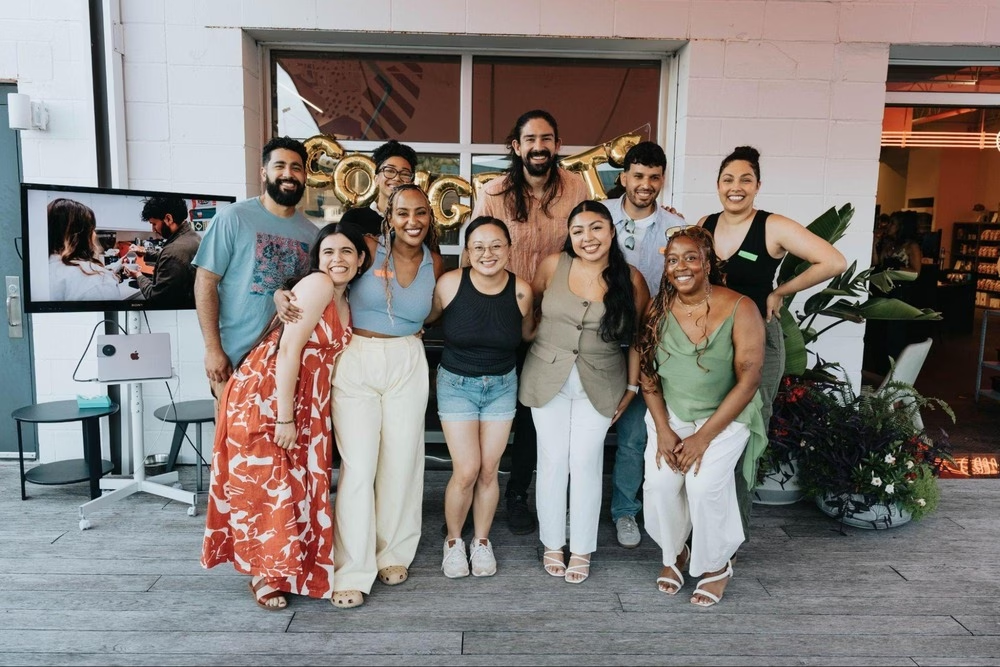Sweet Ren Academy Broadens Access to Coffee Careers



The non-profit—a collaboration between Dogwood Coffee Co. and The Get Down Coffee Co.—is expanding access to specialty-coffee careers through training, residencies, and community partnerships.
BY VASILEIA FANARIOTI
SENIOR ONLINE CORRESPONDENT
Photos courtesy of Sweet Renaissance Coffee Academy
Launched as an independent non-profit in January of 2024, Sweet Renaissance Coffee Academy—commonly referred to as “Sweet Ren“—is emerging as a growing force in efforts to increase equity and representation within the specialty-coffee industry. Based in Minneapolis, Minn., the initiative is the result of a long-standing collaboration between Dogwood Coffee Co., The Get Down Coffee Co., and a team of educators, operators, and coffee professionals aiming to diversify who participates—and who thrives—in specialty-coffee.
What began as a conversation between Houston White, owner of The Get Down, and Dogwood co-founders Dan and Angie Anderson, has since evolved into a structured, multi-pronged program offering barista training, roaster residencies, and contract roasting services, with the goal of building long-term professional opportunities for individuals from underrepresented backgrounds.
“We wanted to disrupt the cycle that kept hiring pipelines homogenous,” Dan shared with Barista Magazine. “There was a clear lack of access to baseline barista training, which meant that those without experience were effectively shut out.”


From Pilot to Program
Sweet Ren began informally as a test initiative within Dogwood and The Get Down, with the early cohorts supported and resourced by both businesses. However, limited staffing and financial capacity soon made it clear that, in order for the program to grow, it would require its own structure.
“A year of development went into building the program,” Dan says. “The curriculum, branding, applications, training—we tested it through Dogwood, and then decided to establish Sweet Ren as a non-profit to expand its potential.”
Today, the barista training cohort involves approximately 30 hours of instruction over an 8-week period. The curriculum includes technical skills such as manual brewing, milk steaming, and espresso extraction, as well as coffee knowledge and “soft skills,” like customer hospitality and interview preparation.


“We designed it to be comprehensive and accessible,” says Jaclyn Fuentes, Executive Director and Program Leader at Sweet Ren. “Training sessions are scheduled flexibly, and we provide stipends to eliminate participation barriers.”
Beyond the classroom, the Academy emphasizes community building. “Participants are encouraged to take risks, be open, and show up as themselves,” Jaclyn continues. “It’s not just about skill-building—it’s about confidence and connection.”



Pathways to Entrepreneurship
One of the program’s distinguishing features is the Roaster Residency, in which select graduates receive access to equipment, space, and mentorship to launch or grow their own coffee brands. Among the group is Yadira Huidor Alvizo, a member of Sweet Ren’s first cohort who went on to found Ruda Coffee—now available online and at several local cafés and events.
“(Yadira) had a clear vision,” Jaclyn says. “We had equipment that wasn’t being fully used and people willing to mentor. That became the foundation for the residency model.”
Another graduate, Alex Castañeda, launched Port 2050, a roasting business that now contributes to training incoming cohorts.



Scaling Through Collaboration
Sweet Ren’s non-profit status has enabled the organization to expand its funding opportunities, build a formal board of directors, and form partnerships with industry stakeholders. Its first official Program Partner is Cafe Imports, whose team members now contribute educational content, host cohort visits, and facilitate sensory training.
“Having access to seed-to-cup education, guided cuppings, and sensory conversations through Cafe Imports has added significant value to the participant experience,” Dan says.
Additionally, Sweet Ren now operates a white-label roasting program that provides contract roasting and fulfillment services, generating revenue that accounts for approximately one-third of its operating budget. Staffed by former trainees, the roasting operation functions as both a job creator and financial engine for the organization.



Overcoming Challenges
Despite its progress, Sweet Ren has faced several challenges. Chief among them: the difficulty of resourcing the early program through operating businesses and the ongoing need to secure sustainable funding.
“We were running cohorts with staff who still held other roles at Dogwood,” Anderson explained. “It was clear we needed a dedicated structure, both for the sake of the program and the people participating in it.”
The non-profit model has since opened the door to fundraising, grant eligibility, and formal donor support—all of which are critical to scaling the program’s four focus areas: training cohorts, residency roasters, contract roasting services, and alumni engagement.



Toward a Broader Vision
Looking ahead, the Academy’s leadership is optimistic about the potential to replicate the model in other cities. While remote learning may support aspects of the curriculum, in-person connection remains central.
“There’s something unique that happens in the room—when people from different backgrounds are learning together, teaching one another, and building community,” says Jaclyn. “It’s not easily replicated online.”



At present, Sweet Ren continues to invest in deepening its local impact. Plans include expanding its cohort frequency, developing curriculum for high school-age participants, strengthening support services for resident roasters (including marketing, bookkeeping, and branding assistance), and growing its alumni network.
“We’ve already seen graduates come back to mentor, launch businesses, and propose new ideas,” Jaclyn says. “That feedback loop is vital—it tells us the model is working.”
For now, Sweet Ren remains focused on Minneapolis, but its leadership welcomes dialogue with others seeking to launch similar initiatives. “We’re happy to share everything we’ve learned,” Dan says. “This model belongs to a larger movement, and we see our role as one part of that collective effort.”
ABOUT THE AUTHOR
Vasileia Fanarioti (she/her) is a senior online correspondent for Barista Magazine and a freelance copywriter and editor with a primary focus on the coffee niche. She has also been a volunteer copywriter for the I’M NOT A BARISTA NPO, providing content to help educate people about baristas and their work.
Subscribe and More!
As always, you can read Barista Magazine in paper by subscribing or ordering an issue.
Read the June + July 2025 Issue for free with our digital edition.
For free access to more than five years’ worth of issues, visit our digital edition archives here.









